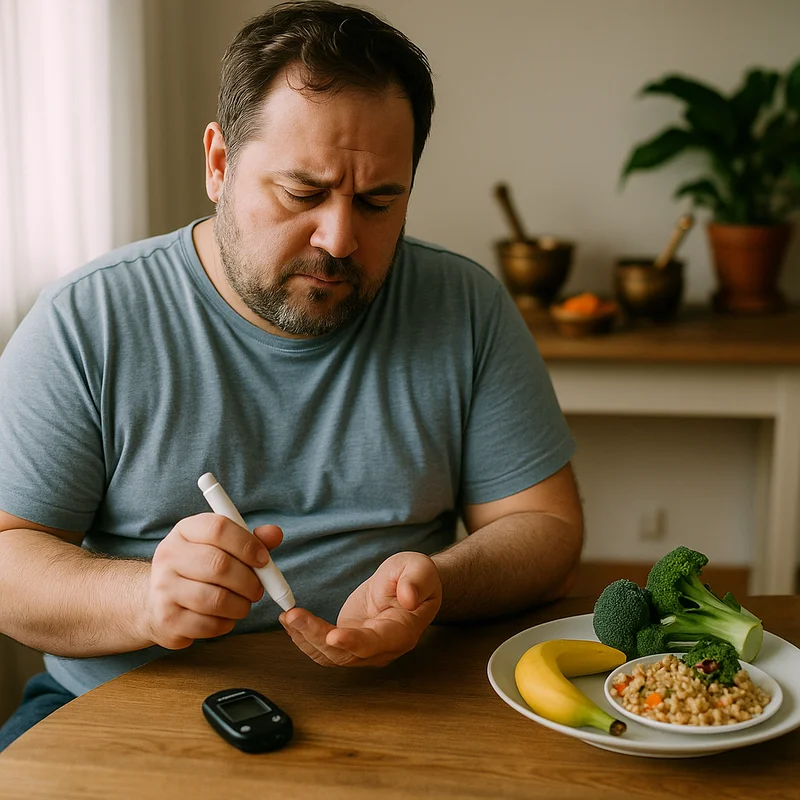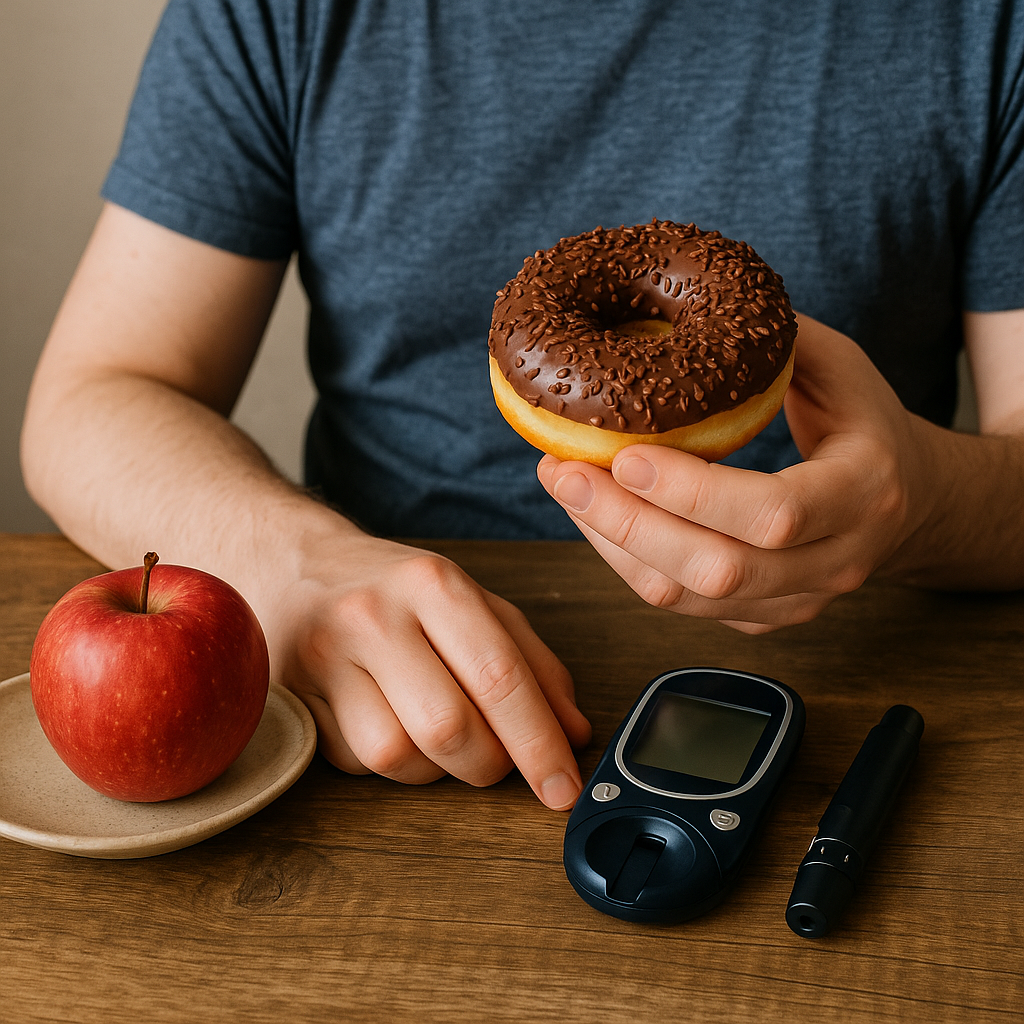What Causes Diabetes? Lifestyle, Genetics & Ayurvedic Insights

It’s not always one clear thing, you know? That’s what I keep telling people when they ask what causes diabetes. It’s not like you wake up one day, eat a donut, and boom—diabetic. Nope. It’s more like a perfect storm of genes, habits, stress, and maybe even how your grandma cooked her rice. And yes, we have to talk about the blood sugar imbalance situation. Because, trust me, it's not just about sugar. There's so much more under the hood.
So let’s slow down and look at this from a few angles—modern science, lived experience, and even ancient Ayurvedic wisdom. Whether you're here because of a family history, a weird blood test result, or just curiosity (good for you), this article’s for you. We'll walk through the big stuff like diabetes risk factors, type 2 diabetes causes, and the role of lifestyle. Then we’ll zoom into Ayurveda—not as some mystical thing, but as practical, grounded help. You might be surprised how much overlap there actually is.

What Is Diabetes?
Types 1 and 2 Explained
Okay, quick breakdown—diabetes isn't one-size-fits-all.
Type 1 diabetes is usually diagnosed early in life. It's an autoimmune condition where your body attacks the cells that produce insulin. Harsh, I know. It’s less about lifestyle and more about immune chaos and, possibly, genetics. No cure yet, but management has come a long way.
Type 2 diabetes, though—that’s where lifestyle has a bigger seat at the table. Here’s where things like diet, stress, and even sleep start stacking up. Your body still makes insulin, but it either doesn’t make enough or your cells ignore it. That’s called insulin resistance, and it's a major part of what causes diabetes in adults.
And yes, there’s also gestational diabetes (during pregnancy) and some other rare types, but we’ll stay focused on the big two for now.
Symptoms and Complications
Some symptoms creep in so slowly you almost miss them—tired all the time, weird thirst, frequent bathroom trips, slow healing cuts. Not dramatic, just… off. But if ignored? That’s when complications like nerve damage, heart disease, even blindness, start becoming real threats.
What’s wild is how many people don’t realize they’re already on the path. That whole "pre-diabetes" zone? It’s a thing—and catching it early is literally life-changing.

स्वयं दवा न लें और प्रतीक्षा न करें। अभी डॉक्टर से चैट शुरू करें
Main Causes of Diabetes
Genetics and Family History
Let’s start with the stuff you can’t control. If diabetes runs in your family, your odds go up. Doesn’t mean you’re doomed, but it means you need to pay more attention to how your body reacts to food, stress, and sleep. There’s no gene that guarantees diabetes—but mix that risk with other factors, and it’s a recipe for trouble.
Honestly, I’ve seen people with “perfect” diets get diagnosed, just because their body had different plans. So yeah, family history matters.
Diet, Inactivity, and Stress
This one’s the trifecta. The heavy hitters.
Let’s talk diet and diabetes: Over-processed carbs, sugar overload, erratic meal times—these throw your blood sugar levels into chaos. And don’t get me started on soda. Even diet soda might mess with insulin signaling, though the jury’s still out.
Then there's sitting. All day. Every day. Our bodies just weren’t made for this kind of static life. Lack of movement worsens insulin resistance.
And stress? Oh wow, it’s huge. Chronic stress jacks up cortisol, which in turn messes with your blood sugar. And honestly, the way we handle modern stress—scrolling endlessly, late-night emails, skipping meals—it only makes it worse.

Ayurvedic Perspective on Diabetes
So here's the thing. Ayurveda doesn’t talk about diabetes in the same language as Western medicine. You won't hear terms like “insulin resistance” or “type 2 diabetes causes” in ancient Sanskrit texts. But—and this is what’s fascinating—the core ideas often line up. Ayurveda just describes them differently. In a more elemental way.
Dosha Imbalance and Metabolism
Ayurveda says that most disease starts with dosha imbalance—specifically, a long-term misalignment of Kapha and Vata, and sometimes Pitta, depending on your constitution.
Now, if you're new to this: doshas are kind of like your body’s bio-energy types. Kapha governs structure and stability. Vata handles movement and communication. Pitta’s all about digestion and transformation.
In the context of diabetes (which Ayurveda refers to as Madhumeha), Kapha is often the main culprit—too much heaviness, sluggishness, accumulation. Think: weight gain, lethargy, congestion. Vata then gets involved when there’s dryness or instability—like nerve issues or extreme thirst.
What’s amazing is how closely this maps to blood sugar imbalance and insulin resistance. When metabolism (called Agni in Ayurveda) is weak, the body can’t process food efficiently. Toxins (known as Ama) build up. Over time, this starts affecting the pancreas, tissues, and, yep, blood sugar levels.
One Ayurvedic doc I spoke to described it like this: “The fire of digestion gets smothered. The sugar doesn’t burn—it pools, ferments, leaks into places it shouldn’t.” Slightly poetic, totally practical.
Panchakarma and Herbal Support
Ayurveda doesn't just shrug and say "change your diet." It’s more holistic and layered. For more serious imbalances, you might be prescribed Panchakarma—a deep detox program that includes oil massages, herbal steam baths, therapeutic vomiting (yes, really), enemas, and dietary resets. Sounds intense? It is. But many people swear it rebooted their system.
More commonly though, people start with gentle daily practices. Warm water in the morning. Fresh, unprocessed food. Spices like fenugreek, turmeric, and cinnamon, which are known to help balance blood sugar. Also herbs like Guduchi, Gymnema sylvestre (called “sugar destroyer” in Sanskrit), and Bitter melon—these are go-tos in Ayurvedic care for type 2 diabetes causes.
And it’s not just about the body. Ayurveda considers your mental and emotional state too. Stress, grief, loneliness—they can mess with your doshas just as much as a bad diet. Mindful practices like meditation, pranayama (breath work), and even simple gratitude rituals are all part of healing.
The big takeaway? Ayurveda for diabetes isn’t just symptom control—it’s about realignment. Getting the body, mind, and spirit back in sync. It’s less “fight the disease” and more “rebalance the system.” Which, honestly, feels like a relief compared to the never-ending pill cycle.
Prevention and Lifestyle Changes
Here’s where it gets empowering. You can make a difference—even if you’ve got a genetic nudge toward diabetes. Prevention isn’t about perfection; it’s about awareness, tiny course corrections, and choosing what fuels your system best.
Healthy Diet Tips
First, let’s get real about diet and diabetes. You don’t need to eat nothing but kale and quinoa to stay healthy. But you do need to be aware of what sends your blood sugar flying. That means cutting back on refined carbs, sugar bombs, and anything that spikes insulin like a rollercoaster.
Go for balance. Think fiber-rich veggies, whole grains (but not in excess), healthy fats, and clean proteins. Ayurveda for diabetes often recommends warm, cooked meals over cold/raw ones, and favors spices like cumin, coriander, and fennel to aid digestion.
And this may sound weird, but how you eat matters too. Slow down. Chew more. Eat without a screen. Your nervous system plays a huge role in digestion—and if you’re eating stressed, it’s not going to go well.
Exercise and Weight Control
Movement is magic. Seriously.
It doesn’t have to be intense—just consistent. Walking after meals, yoga, swimming, dance, anything. The goal isn’t to punish your body but to help it use glucose more effectively and improve insulin sensitivity.
Weight loss isn’t everything, but if you’re carrying excess belly fat (which is a major diabetes risk factor), reducing even 5–10% of your body weight can make a huge difference. That’s not some fitness influencer hype—that’s hard science.
And please, find a routine you like. Hating your workout is a great way to quit.
When to Get Tested
Warning Signs
You might be thinking: “This all sounds good, but how do I know if I’m at risk?”
Some early red flags:
-
You’re constantly tired, even after sleeping.
-
You’re thirsty all the time.
-
You pee more than usual.
-
You get random blurry vision or frequent infections.
-
Cuts take forever to heal.
Even just one of those? Worth a chat with your doctor.
Monitoring Blood Sugar
Testing doesn’t have to be scary. A simple fasting blood sugar or an A1C test can give you a pretty clear picture. If you’re in that “pre-diabetic” range, consider it a nudge, not a curse. It means you have a chance to reverse or delay full-blown diabetes with the right tweaks.
Conclusion
So... what causes diabetes?
It’s not just one thing. It’s a web of genetics, lifestyle, stress, diet, maybe even karma (if you’re into that). But here's the hopeful part: every small, consistent change you make—every nourishing meal, every walk, every deep breath—adds up.
Whether you're drawn to herbal remedies for diabetes, yoga, blood sugar monitors, or Ayurvedic spices, there’s room for all of it in your toolkit.
Don’t wait for a diagnosis to wake up to your health. Start now. Start gently. Start with curiosity.
Call to Action
Curious about balancing your doshas or exploring natural ways to manage blood sugar? Book a consultation with an Ayurvedic specialist. Or sign up for our newsletter—packed with holistic health tips, recipes, and mindful living insights.
FAQs
Can diabetes be prevented through lifestyle changes?
Yes. In many cases, especially with type 2, lifestyle changes around diet, movement, and stress can prevent or delay the onset of diabetes.
What is the Ayurvedic explanation for diabetes?
Ayurveda sees diabetes (Madhumeha) as a result of dosha imbalance, weak digestion (Agni), and accumulated toxins (Ama), often linked to Kapha excess and disturbed metabolism.
Which foods trigger blood sugar spikes?
Refined carbs, sugary snacks, white bread, sweetened drinks, and even large portions of fruit juices can lead to blood sugar spikes. Monitor and adjust.
What are early symptoms of diabetes?
Fatigue, excessive thirst, frequent urination, blurred vision, and slow-healing wounds are some of the early warning signs to watch for.
कोई और प्रश्न हैं?
आयुर्वेदिक डॉक्टर से एक प्रश्न पूछें और मुफ़्त या सशुल्क मोड में अपनी चिंता की समस्या पर ऑनलाइन परामर्श प्राप्त करें।
2,000 से अधिक अनुभवी डॉक्टर हमारी साइट पर काम करते हैं और आपके प्रश्नों की प्रतीक्षा करते हैं और प्रतिदिन उपयोगकर्ताओं को उनकी स्वास्थ्य समस्याओं को हल करने में मदद करते हैं।

